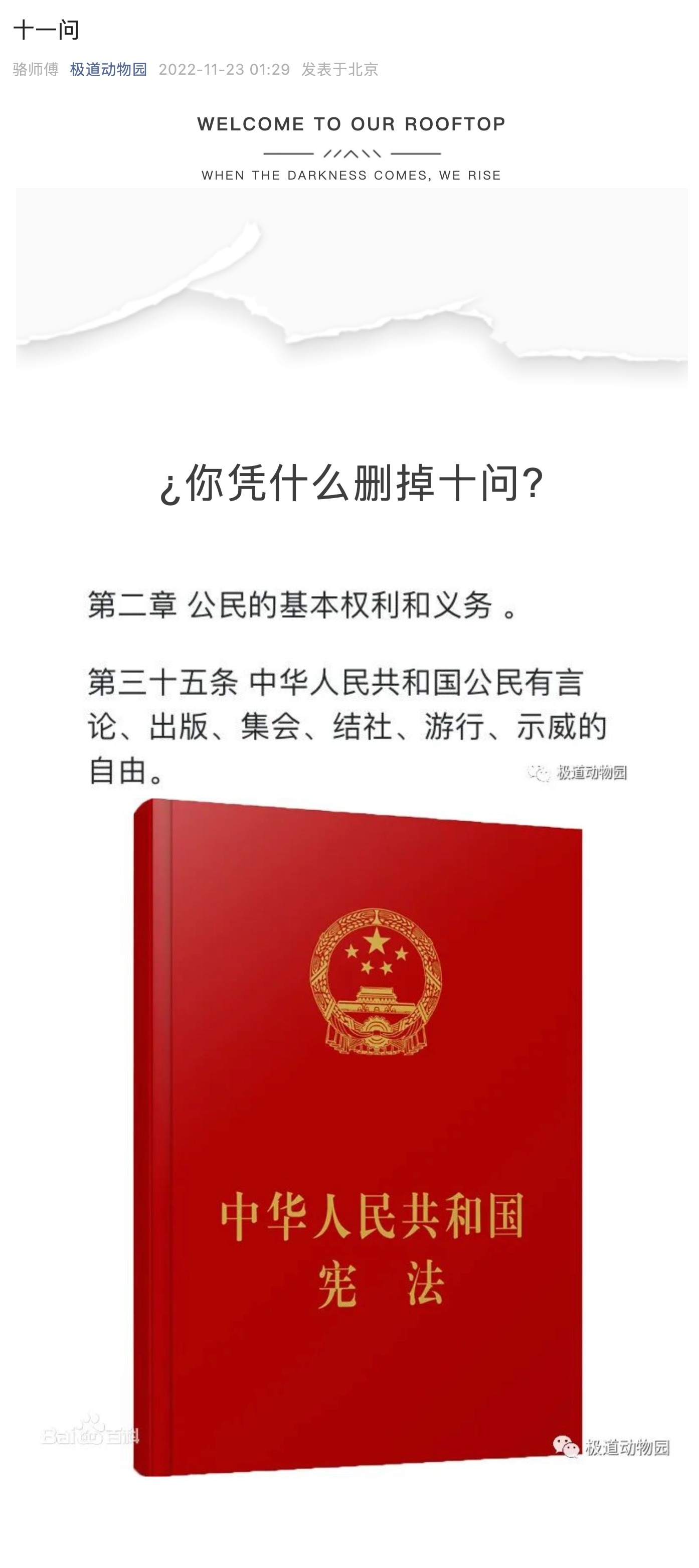Earlier this week, screenshots of “Ten Questions” about China’s pandemic policy began making the rounds on the Chinese internet and social media, attracting a great deal of interest and commentary. Those screenshots have now been deleted, and the WeChat account (长安课堂, Chang’an Ketang, or “Chang’an Classroom”) that posted the article has been permanently banned. CDT has translated the article in full, below, as well as a selection of netizen comments compiled from around the web and from social media. Some of the stances implied by the questions may be controversial, but the posting’s widespread appeal illustrates popular frustration with the intensity and unpredictability of China’s pandemic control regime, while its predictable erasure highlights the tight limits on public discussion.
Ten Questions
As an ordinary peon, I would like to pose the ten questions below to the National Health Commission, the organization responsible for overseeing public health. Might I trouble you to answer the following?
Question One: Is the main responsibility of the National Health Commission to compile data related to COVID-19? How much public outreach work has the National Health Commission done regarding medical treatment for COVID-19 patients? Has the National Health Commission made public the fatality rate of the Omicron variant? How many people has the National Health Commission punished for implementing excessive pandemic prevention measures at the grassroots level? Does the National Health Commission think that this year’s extended, months-long lockdowns in Xinjiang, Tibet and other areas are appropriate?
Question Two: In human history, have we ever successfully eradicated any strain of influenza virus? If not, how can we possibly eliminate SARS-CoV-2? And if it cannot be eliminated, what is the cost of continuing to carry out a “zero-COVID” policy against an invisible, intangible virus? Just how useful are multiple rounds of nucleic acid testing?
Question Three: The vast majority of people have received three or more doses of the vaccine, so why are outbreaks of infections continuing apace? Do the vaccines actually work?
Question Four: Compared to other influenza viruses, is Omicron’s fatality rate low or high? How many people has Omicron actually killed?
Question Five: When it comes to managing COVID-19, what are our benchmarks for lifting restrictions? If there are no objective, scientific benchmarks, does that mean that the restrictions will simply continue?
Question Six: The three recent fatalities in Beijing were all elderly, bedridden patients. How did they get infected? Did contact-tracing find the source of infection? Is it possible that nucleic acid tests yield false positives when someone is infected with the flu? If so, what is the point of nucleic acid testing?
Question Seven: What is our COVID prevention and control policy based on? Is it based on data, or modeling, or speculation? Experts such as Zhong Nanshan, Zhang Wenhong, and Zhang Boli have said that the virulence of Omicron is very low. Why should we put so much effort into trying to manage and control a not-at-all-deadly disease?
Question Eight: Due to systemic differences, Hong Kong, whose population density is much higher than that of the mainland, has never required mass nucleic acid testing for all residents, and pandemic restrictions have been relaxed for the past several months. Life in Hong Kong is back to normal. Has the medical system there been overwhelmed? Why not, and why is the mainland so worried about the medical system being, as they say, “overwhelmed”? Aren’t there [vulnerable] elderly people and children in Hong Kong, too?
Question Nine: More than 120 countries worldwide have long since lifted COVID-related restrictions or controls. Has public health in these countries been harmed? Are their people living normal lives? Why can they live more freely than Chinese people? The World Cup just kicked off in Qatar. None of the fans were wearing masks, and no one was asked to show a nucleic acid test certificate. Are we even living on the same planet as them? Can COVID-19 not harm them?
Question Ten: India and China have roughly similar population sizes, although India has less than half of China’s landmass—and what is the pandemic situation in India like? In Africa, Nigeria’s pandemic prevention efforts have achieved remarkable results. So why not look to India, whose national conditions are similar to China’s? Why not learn from Nigeria, instead of tallying case counts in the U.S.? What practical significance does that have for China’s pandemic prevention and control?
Is it too much to ask that the National Health Commission take the above questions into serious consideration before deciding on and deploying pandemic prevention policy? [Chinese]
Below is a selection of netizen comments responding to “Ten Questions,” collected, archived, and translated by CDT editors:
wayky: Strange, there are more than 100,000+ views. Why didn’t anyone leave comments? // 长安课堂 [the author of the ten questions]: I saw that there were more than 200 comments.
Zihann今天吃啥好纠结:Now this is positive energy!
程娅敏:I’d like to add one question preemptively: Why was this article deleted?
Ingew:We don’t solve problems. We “solve” the people who ask about them.
徐斌辉:It’s such a good article that I predict it will be “harmonized.”
晓芬:To prevent it being harmonized, I’ve already taken screenshots.
王小东:I hope that someone really does step forward to answer these questions.
刘老师13361787700:If this article gets deleted, we have a long dark night ahead of us! [Chinese]
Also being censored is the term “十一问” (“eleven questions,” or “eleventh question”). The term was used by many supporters of the article to criticize or mock the fact that it was deleted. One now-deleted example shows a screenshot of the Chinese constitution and a quote from the section about the rights and duties of Chinese citizens:
Title on the red book cover: “The Constitution of the People’s Republic of China.”
What gives you the right to delete “Ten questions”?
Chapter II The Fundamental Rights and Duties of Citizens
Article 35 Citizens of the People’s Republic of China enjoy freedom of speech, of the press, of assembly, of association, of procession and of demonstration.

source https://chinadigitaltimes.net/2022/11/translation-ten-questions-not-to-ask-about-pandemic-policy/
No comments:
Post a Comment